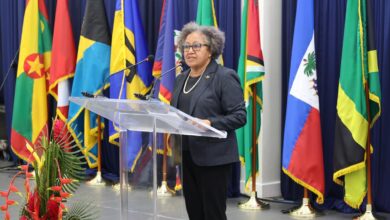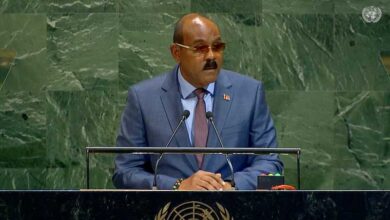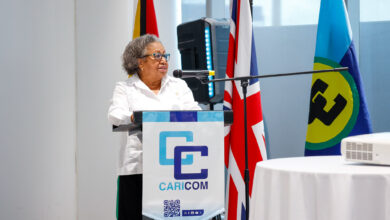“As we meet here this week, we have either just experienced, witnessed or observed the devastation and destruction that hurricane Beryl has left in her wake from the Eastern to Northern Caribbean. If ever there was more urgent time to address interconnected issues, it is now.” – Ambassador David Prendergast, Director, Sectoral Programmes, CARICOM Secretariat
Mr. Kaylon Young, Acting Ports Commissioner, Belize Port Authority (BPA),
Chair and Board Members of the Belize Port Authority (BPA),
Ms. Brigit Gijsbers, Deputy Director General for Civil Aviation and Maritime Affairs, Ministry of Infrastructure and Water Management, Kingdom of the Netherlands,
Mr. Kyler Jones, Research, Training and Compliance Officer (BPA),
Mr. Camille Bourgeon, Technical Officer, IMO Secretariat,
My colleague presenter in this segment, Ambassador Carlos Fuller,
Participants,
Ladies and gentlemen
It is my distinct honour to represent the CARICOM Secretariat at this very timely Regional Workshop on “the IMO GHG Strategy to Reduce Shipping Emissions in the Caribbean.” Critical to this exercise that we are participating in today are the laudable efforts by the Government of Belize, through the Belize Port Authority and the International Maritime Organization (IMO) to bring together at the table regional maritime transport, climate and environment public officials and stakeholders, including our regional private sector, to seek to build holistic and cohesive policy-driven approaches to address the growing challenges and ravages of climate change, particularly in this Region. The Region’s voice must continue to be heard. We cannot afford to work in silos and must band together in the interests of this Region and also for the future of our planet. I hope that this will be the first of many such engagements to bring different interests together to chart the way forward and to develop next steps. As Brigit Gijsbers said earlier, we hope that this Workshop will improve the understanding of all the participants.
As we meet here this week, we have either just experienced, witnessed or observed the devastation and destruction that hurricane Beryl has left in her wake from the Eastern to Northern Caribbean. If ever there was more urgent time to address interconnected issues, it is now. We, therefore, thank the hosts and organizers for this effort and anticipate robust discussions and actions emanating from this Workshop.
The Region is now at the beginning of the Atlantic hurricane season, which has started with the first, early hurricane of the season – in July. It has been projected to be extremely active with a forecast of 11 hurricanes, five of them slated to be major storms of Category 3 intensity or higher.
Never in my own lifetime have I ever witnessed such an early active start to the hurricane season. Beryl has clearly demonstrated the unprecedented impacts of climate change. You may also wish to consider that the Caribbean Climate Outlook Forum (CARICOF), coordinated out of the Caribbean Institute of Meteorology and Hydrology (CIMH), has predicted near record heat for the Caribbean Region from April to September 2024. Several of our Member States have already been experiencing periods of prolonged drought, and this has been compounded by forest and bush fires across the Region and we continue to witness sea level rise, salinisation of aquifers, coastal erosion and land degradation.
All of us here today understand climate change has a very tangible human, economic and financial impact on CARICOM. Following the devastation and mammoth financial fallout from Beryl, which is currently being assessed, we have significant destruction from Beryl in Grenada (Carriacou and Petit Martinique), St. Vincent and the Grenadines (Union Island and Mayreau), Barbados and Jamaica (particularly the Southern Parishes). You will also recall the previous record-breaking 2017 hurricane season when Hurricanes Irma and Maria within a period of two weeks charted paths of destruction across the Region. Ambassador Fuller also mentioned earlier and set it out clearly that potential impact of climate change on transportation networks, ports, road infrastructure and the potential loss of 1.2 billion USD per year to GDP.
The Secretary General of CARICOM recently reminded us that “Climate change is not a distant threat, it is a present reality with profound implications for human health, livelihoods and well-being. From rising temperatures and extreme weather events to changing disease patterns and food insecurity, the effects of climate change are far-reaching, disproportionately affecting vulnerable populations, including young people, indigenous communities and marginalised groups.” SIDS, therefore, remain at the frontlines of the triple planetary crises of climate change, pollution, and biodiversity loss – which compound each other- and consume limited financial and human resources. I echo what previous presenters said that we need to ensure that we are resilient and adaptable and that there is tailored support for SIDS and the need to shape and build regional capacity to understand and address vulnerabilities.
Turning to the maritime industry and making the linkages – it is worth noting that during COP28, leaders in the maritime industry acknowledged the urgent need for decarbonization, emphasizing that shipping maintains among the lowest CO2 emissions per tonne per mile compared to other transport sectors. At the conference, CEOs of shipping companies advocated for an end date to fossil-fuel-only powered newbuilds and urged the International Maritime Organization (IMO) to hasten the transition towards green fuels. Concurrently, the IMO unveiled ambitious climate goals, aiming to slash greenhouse gas emissions by a minimum of 40% and significantly ramp up the adoption of zero or near-zero emission technologies by 2030. This aligns closely with COP28’s broader call to triple global renewable energy capacity and double energy efficiency improvements by the same year. The integration of these targets into strategies to reduce shipping emissions in the Caribbean underscores a holistic approach to tackling climate change across all sectors, aiming for sustainable and equitable growth in the region and beyond.
Shipping, nevertheless, is still a contributor to climate change at around 3% annual contribution to global GHG emissions. Added to this are the other negative impacts and pressures from shipping and other maritime vessels, including pollution, anchor damage, biodiversity impacts from ballast water etc. These all accumulate pressures to the environment and act to reduce environmental resilience.
We have, therefore, a general incentive to greening and increasing the efficiency of shipping and maritime operations. One is, obviously, the moral obligation to act in addressing climate change and fulfilling other treaty obligations, and two, is to seek resource efficiencies towards profitability of shipping and port operations. Both imperatives are vital to vulnerable SIDS. The latest call comes from the Outcome document of the recent Fourth International SIDS Conference, which called for:
- Scaling up planning, development and management of quality, reliable, sustainable and resilient infrastructure and energy-efficient land, marine and air transportation systems;
- Investing in sound, safe, sustainable, climate resilient, and affordable land, air, maritime and inter-islands transportation infrastructure; and
- Establishing integrated and sustainable maritime and air transportation systems to foster regional economic and value chain integration, improving inter-island connectivity, modernizing transport fleets and equipment.
So, these issues lead to the question – where does CARICOM fit in this context and what are we doing, especially as CARICOM and all SIDS, continue to bear the brunt of global climate change? We are alarmed by the apparent drawback by the international community from the ambition necessary to limit increases in global temperature to 1.5 degrees above pre-industrial levels.
While we maintain our advocacy under the UNFCCC, the Region is acting to address our growing concern with the lack of ambition. Antigua and Barbuda, in partnership with Tuvalu and the Commission of Small Island States on Climate Change, led a request for an advisory opinion on climate change-related legal questions to The International Tribunal for the Law of the Sea (ITLOS). The court asserted that state parties are legally bound to curb emissions to safeguard the marine environment.
The Region has also supported the Government of Vanuatu in the request for advisory opinion from the International Court of Justice (ICJ) on the obligations of States with respect to climate change.
While seeking to adapt to and mitigate the impact of climate change, we face the persistent challenge to access affordable finance whether from the private capital market or multilateral financial institutions. In this regard, the Region is supporting the Bridgetown Initiative which proposes actions to close the growing funding gap through urgent actions to provide emergency liquidity to developing countries, as well as the reform of the global financial architecture to address the urgent need more fairly and effectively for financing for resilience-building and achieving the Sustainable Development Goals (SDGs).
The CARICOM Secretariat and the Community as a whole, play an important role, providing leadership and guidance in addressing the complex challenges posed by climate change and in crafting the appropriate policy responses in collaboration with our Member States. We thank our partners, and their ongoing partnership so that we can address some of these critical issues. We have been making significant strides in advancing climate change adaptation and mitigation efforts within the Caribbean Community, including the establishment of regional frameworks and policies, and the implementation of community-based initiatives and awareness campaigns.
The Region, in recognition of the need for active response and to drive our actions, established the Caribbean Community Climate Change Centre (5Cs) which since it became fully functional on August 2, 2005, has been at the forefront in working to coordinate the Region’s response to climate change and on effective solutions and projects to combat the environmental impacts of climate change and global warming. They have focused, inter alia, on projects which include enhancing resilience, climate change and resilience in the health sector, regional planning for climate-compatible development in the Region, coastal protection for climate adaptation for SIDS in the Caribbean, a Climate Change Adaptation Programme (CCAP) and education and public awareness.
The establishment of SIDS DOCK in 2015 is a United Nations (UN)-recognised international organisation which addresses climate change, resilience, and energy security in small islands. SIDS DOCK represents thirty-two small islands and low-lying developing states across the globe and is so named because it is designed as a “DOCKing station” to connect the energy sector in SIDS with the global markets for finance and sustainable energy technologies. Our host, Belize also hosts the SIDS DOCK Secretariat.
Further, the Caribbean Centre for Renewable Energy and Energy Efficiency (CCREEE) was established in 2018 as a pivotal institution for advancing sustainable energy development in the Caribbean. CCREEE aims to expedite the adoption of renewable energy and energy efficiency technologies across Member States. The center focuses on bridging the implementation gap for sustainable energy projects within CARICOM Member States.
The decision at COP28 in December 2023 to operationalize the Loss and Damage Fund and growing acknowledgement in the international community that the Bridgetown Initiative presents a more relevant financial approach to addressing the unique needs of our Region, are but two examples of the impact of CARICOM’s advocacy. CARICOM will continue its mission to speak loudly and clearly in the international community with determined and deliberate advocacy which has helped to spur positive change for critical hemispheric and global issues. But how we can continue to do it:
- In consonance with and with the guidance and direction of the Member States which make up the Community and in partnership with stakeholders such as yourselves;
- Utilising convening authority to bring the stakeholders together to advance the relevant issues from a regional perspective;
- Undertaking a coordinating role, as appropriate, to take forward the issues to create regional frameworks to ensure that our voices continue to be heard in the international community…
We look forward to these discussions and to hear from you as we determine the best way forward on these critical issues.
Thank you!
10 July 2024






